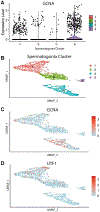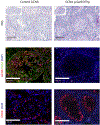Variants in GCNA, X-linked germ-cell genome integrity gene, identified in men with primary spermatogenic failure
- PMID: 33963445
- PMCID: PMC8266742
- DOI: 10.1007/s00439-021-02287-y
Variants in GCNA, X-linked germ-cell genome integrity gene, identified in men with primary spermatogenic failure
Abstract
Male infertility impacts millions of couples yet, the etiology of primary infertility remains largely unknown. A critical element of successful spermatogenesis is maintenance of genome integrity. Here, we present a genomic study of spermatogenic failure (SPGF). Our initial analysis (n = 176) did not reveal known gene-candidates but identified a potentially significant single-nucleotide variant (SNV) in X-linked germ-cell nuclear antigen (GCNA). Together with a larger follow-up study (n = 2049), 7 likely clinically relevant GCNA variants were identified. GCNA is critical for genome integrity in male meiosis and knockout models exhibit impaired spermatogenesis and infertility. Single-cell RNA-seq and immunohistochemistry confirm human GCNA expression from spermatogonia to elongated spermatids. Five identified SNVs were located in key functional regions, including N-terminal SUMO-interacting motif and C-terminal Spartan-like protease domain. Notably, variant p.Ala115ProfsTer7 results in an early frameshift, while Spartan-like domain missense variants p.Ser659Trp and p.Arg664Cys change conserved residues, likely affecting 3D structure. For variants within GCNA's intrinsically disordered region, we performed computational modeling for consensus motifs. Two SNVs were predicted to impact the structure of these consensus motifs. All identified variants have an extremely low minor allele frequency in the general population and 6 of 7 were not detected in > 5000 biological fathers. Considering evidence from animal models, germ-cell-specific expression, 3D modeling, and computational predictions for SNVs, we propose that identified GCNA variants disrupt structure and function of the respective protein domains, ultimately arresting germ-cell division. To our knowledge, this is the first study implicating GCNA, a key genome integrity factor, in human male infertility.
Conflict of interest statement
Figures





References
-
- Agarwal A, Baskaran S, Parekh N, Cho CL, Henkel R, Vij S, Arafa M, Panner Selvam MK, Shah R (2021) Male infertility. Lancet 397(10271):319–333 - PubMed
-
- AlAsiri S, Basit S, Wood-Trageser MA, Yatsenko SA, Jeffries EP, Surti U, Ketterer DM, Afzal S, Ramzan K, Faiyaz-Ul Haque M, Jiang H, Trakselis MA, Rajkovic A (2015) Exome sequencing reveals MCM8 mutation underlies ovarian failure and chromosomal instability. J Clin Invest 125(1):258–262 - PMC - PubMed
-
- Alhathal N, Maddirevula S, Coskun S, Alali H, Assoum M, Morris T, Deek HA, Hamed SA, Alsuhaibani S, Mirdawi A, Ewida N, Al-Qahtani M, Ibrahim N, Abdulwahab F, Altaweel W, Dasouki MJ, Assiri A, Qabbaj W, Alkuraya FS (2020) A genomics approach to male infertility. Genet Med 22(12):1967–1975 - PubMed
-
- Bailey TL, Gribskov M (1998) Combining evidence using p-values: application to sequence homology searches. Bioinformatics (Oxford, England) 14(1):48–54 - PubMed
MeSH terms
Substances
Supplementary concepts
Grants and funding
- HD096723/Eunice Kennedy Shriver National Institute of Child Health and Human Development
- R00 HD090289/HD/NICHD NIH HHS/United States
- IUT34-12/Estonian Research Council
- 918-15-667/Nederlandse Organisatie voor Wetenschappelijk Onderzoek (NL)
- Start up fund/Magee-Womens Research Institute
- 2017/26/D/NZ5/00789/Narodowe Centrum Nauki
- R01 GM125812/GM/NIGMS NIH HHS/United States
- Faculty Fellowship Award/Magee-Womens Research Institute
- PRG1021/Estonian Research Council
- HD080755/Eunice Kennedy Shriver National Institute of Child Health and Human Development
- 209451/WT_/Wellcome Trust/United Kingdom
- R00H090289/Eunice Kennedy Shriver National Institute of Child Health and Human Development
- GM125812/GM/NIGMS NIH HHS/United States
- F31 HD101323/HD/NICHD NIH HHS/United States
- 209451/Z/17/Z/WT_/Wellcome Trust/United Kingdom
- GM127569/GM/NIGMS NIH HHS/United States
- P50 HD096723/HD/NICHD NIH HHS/United States
- CRU326/Deutsche Forschungsgemeinschaft
- T32 HD087194/HD/NICHD NIH HHS/United States
- R21 HD080755/HD/NICHD NIH HHS/United States
- R01 GM104007/GM/NIGMS NIH HHS/United States
- R01 GM127569/GM/NIGMS NIH HHS/United States
- 2015/17/B/NZ2/01157/Narodowe Centrum Nauki
LinkOut - more resources
Full Text Sources
Other Literature Sources
Medical
Molecular Biology Databases

